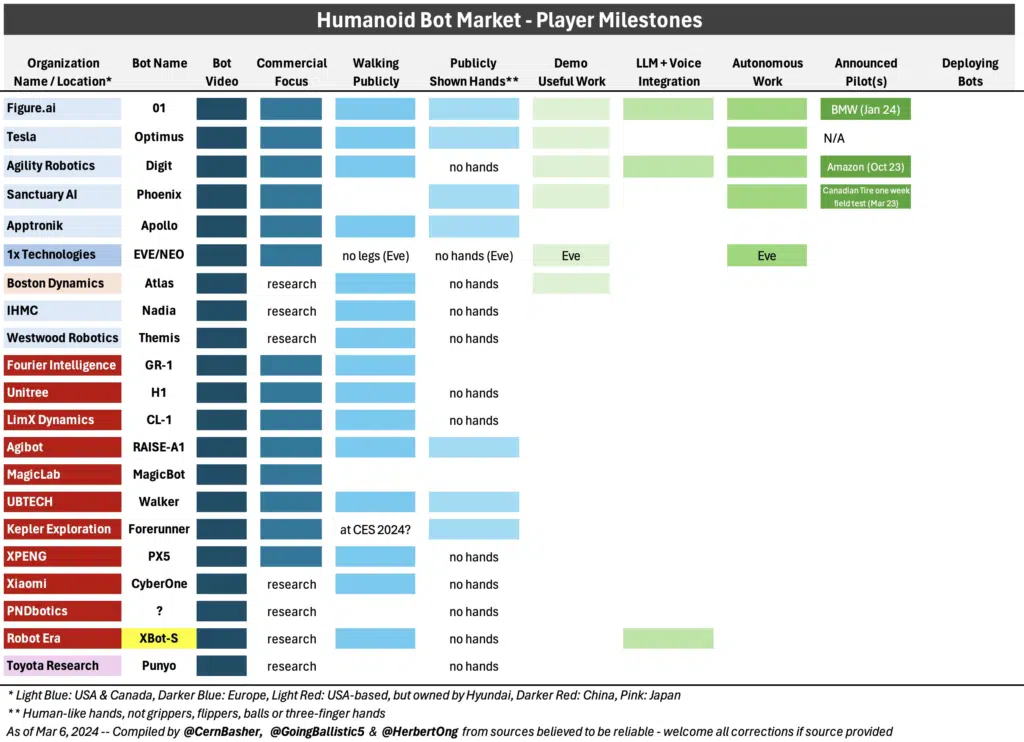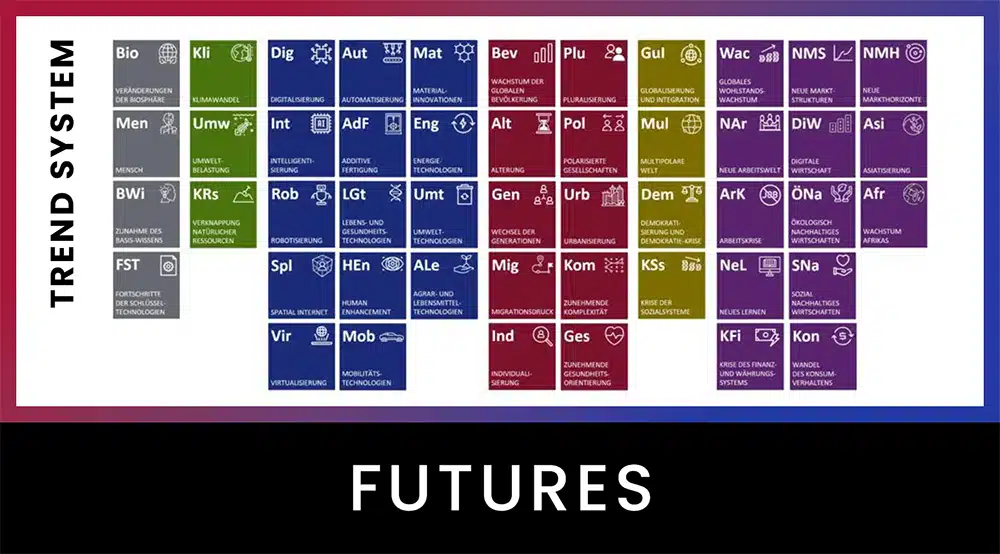Dr. Pero Mićić
Yesterday’s science fiction, today’s reality, tomorrow’s revolution? just like in the movie iRobot. If and when humanoid robots find their way into our world, they will change work, the economy and society more radically than almost anyone can imagine. Including your job and your company.
Robots have been working in our factories for over 60 years. Now a new generation is coming. The humanoid robots. They are physically built like we humans.
Will the humanoids now also become intelligent? As the Chinese government has announced? You’ll find all the arguments and the answer in this episode. And I’ll give you advice on what you can do now to make yourself more future-proof.
In the first episode on humanoid robots, we looked at how good the physical capabilities of humanoid robots will be. The result: they can already or will soon be able to perform a large part of the physical tasks of humans. And in the long term, they will be able to do virtually everything that a human can do physically. After all, there will be a shortage of over 100 million workers worldwide by 2030.
Humanoid robots: Which already exist?
This overview by Cern Basher on X shows that 21 companies and laboratories are already developing humanoid robots. Probably a few more. Five of these publicly visible humanoids can already perform tasks autonomously. But also, here in the column on the far right, you can see that none are yet being sold to customers. The ones marked in red come from China, the blue ones from the West. Boston Dynamics belongs to Korean Hyundai and Punyo is made by Toyota in Japan.

This second episode is about the intelligence of humanoids. In later episodes, we will look at the social impact, finances and also the question of how we humans will make a living if robots take so much work off our hands. And what the hell we will then do all day long. And how our lives will look like.
Will humanoid robots not only be physically very skilled, but also intelligent?
Back to the core question here: Will humanoid robots not only be physically very skilled, but also intelligent? Possibly so intelligent that millions and billions of humanoids will work for us?
I always refer to cognitive intelligence here. So not emotional intelligence and not the other human intelligences. We can find a solid answer by systematically naming and analyzing the plus and minus arguments. First the plus arguments in favor of humanoids having a very high cognitive intelligence.
Intelligent humanoid robots: plus arguments
1. Humanoid robots will acquire enormous cognitive abilities through AI
This is the really new development. Humanoid robots are now becoming human-like intelligent. At least cognitively. The robot body now gets a brain. Or in other words, AI is now getting a body.
AI can already perform almost all cognitive tasks with plug-ins. There is no human being with the same skills in so many different areas as ChatGPT or Gemini. What they don’t know and can’t do, they get via plug-ins from solid sources such as Wolfram Alpha for mathematical skills. Do these AIs make mistakes? Sure, just like humans. Do they hallucinate? Do they sometimes pretend to know the answer? Sure, just like humans. Very important: If you only look at today’s capabilities, you will be wrong about the future. We will never again have AI as bad as it is today.
AI has long been able to recognize and understand the emotions in a face. Even the state of health. AI often understands us better than most people. AI can speak virtually all languages. With AI, you may soon no longer need to know any programming languages at all, because you can write software using ordinary human language.
AI can perform complex work processes. AI has become multimodal, meaning it can handle text, images, video, mathematics and multidimensional models. AI can already drive a car amazingly well. This is an enormously complex task. In contrast, many jobs in production, the trades and in the household are very simple.
So the robots are getting an AI brain. With all the skills I have just mentioned. And many more. This is the big step in development that is currently happening. And at high speed. That’s why there are now so many major advances with humanoid robots.
This means that humanoid robots will not only be able to perform simple physical tasks, but also complicated and complex ones. In other words, work that often involves surprises. This is the case, for example, in the trades, in catering services and in the household.
2. Humanoid robots are always highly focused for the highest quality of work
Unlike us, a humanoid robot does not get lost in thought, cannot be distracted and does not lose concentration. Not even after many hours and days. A robot doesn’t experience a bad day. Anger, sadness or hunger do not affect its work. Nor do medications or drugs.
The work quality of humanoid robots will always be high, precise and consistent. As high as one cannot expect from a human, only out of human kindness. After all, we are not machines.
3. Humanoid robots don’t’ forget anything
How much of what you learned in school and training do you really remember? How much of what you read in the last book do you remember in detail? How sure are you that you remember every detail from the process description or work instruction? Huh? Exactly!
When we retire, our knowledge and skills are lost to our company. When we die, it is lost to the world. We humans have to build up our knowledge again and again with each generation.
Robots, on the other hand, forget nothing, except the outdated knowledge that they have to and should forget. Their knowledge and skills are therefore constantly growing.
We humans have no chance of keeping up with them. Unless we expand our brains, but that’s a whole. other topic.
4. AI robots learn unimaginably fast
As I said before, the cognitive capabilities of humanoids today should not be used as a benchmark for their future capabilities. Because their abilities are growing exponentially. I’ll make a special episode on this later. Here is a preview:
Humanoid robots learn from humans. With a so-called motion capture suit, i.e. a suit that captures the movements of a human very precisely, you can train an AI and thus a robot. And it gets better and better. So that they can teach us how to dance, which requires a lot of patience with some talents.
Humanoids learn by observing humans. Whether through direct observation or from videos. AIs are currently being trained for autonomous driving by watching millions of hours of 360-degree videos of very good drivers. The result is the best driver in the world, who will soon drive many times more safely than any human on earth. And we will never catch up.
Humanoid robots learn by themselves. Back in 2019, AlphaGo defeated all Go grandmasters by a landslide, even though the AI wasn’t trained to play. It simply learned by itself.
Humanoids learn from each other. Yes, the robots will also be able to learn individually. If one robot learns how to make coffee, every other robot in the world will have this skill to, because it downloaded the skill from a skill sharing platform. I presume that robot manufacturers will limit what a humanoid can learn. You know what I mean.
In short: humanoid robots will be as intelligent as AI will be cognitively intelligent. AI systems will become the brains of the robots. And the AI systems will get a body.
Intelligent humanoid robots: minus arguments
Now let’s look at the minus arguments that speak against humanoid robots being sufficiently intelligent to work for us. Keep in mind, this is only about feasibility. The extent to which humanoids will be socially accepted and legal is a completely different matter.
1. Further development of AI could fail for technological reasons
This is the only argument against humanoid robots being so intelligent that they will work for us on a large scale. And it’s an argument in the subjunctive, it could happen. How?
1a. It could fail due to a lack of data.
But only in theory, because the amount of data continues to grow at an unimaginable rate. And yes, the quality of the data too.
1b. It could fail because AI technology stops evolving.
Well, even if no new advances and insights were made as of today, the methods used today with neural networks and end to end training would be sufficient to make humanoid robots intelligent enough. So it is unlikely that this argument will work.
1c. It could fail because of a lack of computing power.
Not really, it could just happen that progress is slower than I am assuming here. I don’t think it’s possible that the development of AI will fail completely due to a lack of compute.
1d. AI could fail due to lack of energy.
The same applies here. Yes, AI will need very large amounts of energy. But the rapid expansion of renewable energy will continue to increase the usable amount of energy. Progress may be slower, but it will not fail entirely due to a lack of energy.
In view of the enormous progress made by AI, which can be seen almost on a weekly basis, and in view of the enormous investments, it is really very unlikely that AI will stop developing now and that humanoid robots will not become artificially intelligent.
Result
And here is the result of our analysis: it is unambiguous. Yes, humanoid robots will be cognitively intelligent enough to work for us in large numbers. Far more intelligent than the industrial robots and special robots we have been using so far.
In the first episode in this series on humanoid robots, I answered the question of whether their physical abilities will be sufficient to do much of our work. The answer was a clear yes.
In this second episode, we looked at whether they will also be cognitively intelligent. And again, the answer is a pretty confident yes.
Mind you, for humanoid robots to work for us, they don’t have to be able to do everything we humans can do. Humanoid robots will be able to achieve enormous physical and cognitive performance. They will therefore find their way into our working and living environments. They will lead to serious and revolutionary changes. More on this in the following episodes.
What can you do now?
Create a matrix:
On one axis, list in rows all the physical processes and activities that need to be completed in your company.
On the second axis, list the years from 2024 to 2035 in columns.
At each intersection, write the percentage of the respective activity that can be performed by a humanoid robot in the corresponding year. Of course, this is only your first intuitive estimate.
Justify your estimate. The further into the future you get, the fewer arguments you will find that a humanoid cannot perform the task.
Let your colleagues and employees make the same assessment, independently of you. You might want to show them my videos beforehand. You will be amazed at how much their assessments differ from yours.
Now it’s time to prioritize. Search and find information about robotics for each activity with your team. Start initial discussions with solution providers.
Become a member of our Bright Future Leaders community. I will regularly send you free tips and strategies to make you and your company more future-proof. No spam! Promised!
Further articles on humanoid robots:
– Humanoid robots: the solution to the labor shortage? (Part 1)
– Humanoid robots: how will they learn? (Part 3)
– Humanoid robots: how much will they cost? (Part 4)
Have a bright future!
Placeholder






























